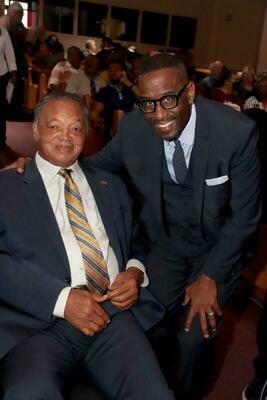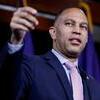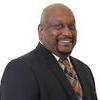Simmons College of Kentucky Announces the Jesse L. Jackson, Sr. Center for Racial Justice at MLK Celebration Event
 Rev. Dr. Kevin Cosby and Rev. Jesse L. Jackson, Sr. remembering Dr. Martin Luther King, Jr. during the special service hosted by Simmons College of Kentucky. Photo by Allen B. Hill/Louisville Defender
Rev. Dr. Kevin Cosby and Rev. Jesse L. Jackson, Sr. remembering Dr. Martin Luther King, Jr. during the special service hosted by Simmons College of Kentucky. Photo by Allen B. Hill/Louisville Defender
Louisville’s Historically Black College Simmons College of Kentucky will soon house the Jesse Jackson, Sr. Center for Racial Justice. This is a “Call to Action” as Louisvillians are still digesting the U. S. Department of Justice’s Investigation into the Louisville Metro Police Department. "The last person to speak to Martin Luther King was the Rev. Jesse Jackson," said Rev. Dr. Kevin Cosby, president of Simmons College. "Jesse Jackson picked up the mantle of Dr. King, and since 1968, for 55 years, he has been a stalwart champion for racial justice."
“Because the DOJ Report (86-pages) identifies ongoing racial injustice against the black community by LMPD, we will announce the formation of an initiative to coordinate a response to systematic and structural racism,” said Dr. Cosby.
Cosby added, “This will navigate Black Louisville from racial disparities to true equity.”
The announcement was made on Tuesday, April 4 on the 55th Anniversary of the assassination death of Rev. Dr. Martin Luther King, Jr. as Simmons College of Kentucky hosted a special program titled “From Memorial to Movement,” at St. Stephen Baptist Church, 1018 S. 15th Street.
According to Cosby, “structural and systemic racism in Louisville and America, and it reflects a bigger problem that we have not faced.” He said the “police are only a symptom of a much deeper problem—the centuries old disparity between the races.
"The reason why there are disparities is not because of Black nature or Black nurture, but because of the legislature," he said. "Our objective is to fix public policy."
Dr. Cosby made the following points about disparities in Louisville:
• Blacks are 13.2 percent of the population, yet Blacks are 40 percent of the homes. In an Equitable society, Blacks would be 13.2 percent of the homeless
• Blacks are 13.2 percent of the population, yet Blacks are 30 percent of all incarcerated. In an Equitable society, Blacks would be 13.2 percent of the incarcerated
• Blacks possess 2.6 percent of the wealth. In an Equitable society, Blacks would possess 13.2 percent of the wealth
Dr. Cosby said Blacks must be resourceful to address their problems. “We do not need other people to do it for us.”
He said the Jesse L. Jackson, Sr. Center for Racial Justice at Simmons will educate, advocate and legislate. According to Dr. Cosby, the JLJ Center will educate people on social and systemic racism. It will advocate for just laws, policies, systems and structures and it will legislate by working to improve public policy in order to move from disparities to equity.
How will the Center be funded? A contribution was made by The Eula May and John Baugh Foundation based in Houston, TX. The Baugh foundation has approved a $2 million grant to the Jesse L. Jackson Center for Racial Justice at Simmons College of Kentucky,
Speaking at the event, Callie Langton, Administrator for the Foundation said the organization was honored to support the center with the $2 million grant.
"We call on other funders, other individuals and other people in the community to join together with us in our commitment to supporting Simmons College and the new center for racial justice," she said.
The program opened with a selection from the Simmons Symphonic Orchestra, Nearer Thy God to Thee, led by Simmons Music Department Chair Dr. Kevin Davenport. Dr. Frank Smith, Executive Vice President brought greetings followed by a responsive Litany by David Cassady, Cheri Mills delivering the opening prayer and Congregational Songs.
The Louisville Defender Newspaper had an exclusive interview with Simmons President Rev. Dr. Cosby following the event. The interview was as follows:
Defender: What is your view of policing in Louisville after reading the DOJ Report?
Dr. Cosby: Policing cannot be separated from the political policies that govern people’s lives. Words like police, policy, politicians, poles, and politics originate from the same Greek word—polis. The polis is how society is structured to benefit some and exclude others. The reason why we are unable to fix police malfeasance is because we separate issues of policing from issues of public policy that consign certain communities to limited opportunities, solely based on race. Police officers simply reinforce public policies instituted by politicians who socially and economically exclude black people. We will never fix bad policing until we first fix centuries of bad policies instituted by racist politicians.
Defender: What is the number one solution to correct disparities in the way African Americans are treated in policing?
Dr. Cosby: Disparities are rooted in centuries of anti-black propaganda. It is almost impossible to eradicate the implicit bias that white America has toward the Black community because it is rooted in historical narratives that have been used to justify white domination and Black subordination. The same racist ideologies that fostered the lynching of Black bodies in the late 19th and early 20th centuries is the same ideology that makes police malfeasance possible today.
Defender: When you look at policing, you have to address Black-on-Black crime. There has been an increase in Louisville. How can the community and its leaders play a role in stopping these senseless crimes that are taking an alarming number of African American lives?
Dr. Cosby: First, we have to address the misunderstanding that there is something dysfunctional about Black people that causes them to prey on each other disproportionately. Truthfully, crimes are, in general, misdeeds of proximity and opportunity, not race. According to statistics from the FBI’s Criminal Justice Information Services Division white person is overwhelmingly more likely to be victimized by another white person, and the same is true for a Black person. Crime victimization simply not a matter of race. Second, Dr. Martin Luther King, Jr. observed, “Black-on-Black crime is a derivative of systemic and structural crime committed against the Black community.” Blacks often suffer from misplaced anger. For example, if you are in a trapped room and you bang on the door trying to get out, then a direct expression of anger, such as knocking on the door, would be appropriate because the door is the direct cause of keeping you trapped. However, if you are in the same room, and you kick the chair, that is displaced anger. Much of the crime in the Black community is displaced anger often directed toward other Blacks because the real issue is white supremacy and structural injustice. If we can dismantle Black disparities that are rooted in systemic racism, we will go a long way toward eradicating the displaced anger Blacks often direct at each other.
Simmons College of Kentucky is an accredited private, co-educational historically black college located in Louisville, Kentucky. Founded in 1879, Simmons College is an institution of biblical higher education dedicated to educating people in the urban context through vital academic and professional programs in order that they may become productive citizens and agents of change in society.
Please support The Coastal Chronicles by subscribing today!
You may also like:






